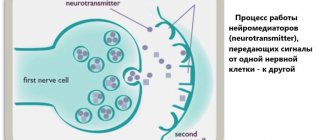Depression is one of the most common diseases. In terms of prevalence, it is second only to cardiovascular diseases. And of all those suffering from depression, no more than 20% seek qualified help.
In this article we will tell you about all the drugs used to treat depression.
All medications with antidepressant effects can be divided into several groups:
- Antidepressants.
- Normotimic drugs.
- Neuroleptics.
- Tranquilizers.
- Nootropics and metabolic agents.
- Herbal remedies.
- Amino acids.
- Psychostimulants.
Normotimic drugs
Medicines in this group have an antidepressant effect only in cases where the depressive state is caused by chronic affective diseases, such as bipolar affective disorder (BD, manic-depressive psychosis), cyclothymia, dysthymia, schizoaffective disorder. Most commonly used medications:
- Carbamazepine (finlepsin)
- Depakine chrono
- Lamotrigine (Lamictal)
- Lithium carbonate
How dangerous are antidepressants for the human body?
Are antidepressants dangerous to your health? People are as afraid of these drugs as they are of antibiotics. There are many myths around these medications. How dangerous are antidepressants really? First of all, you should understand that no doctor will prescribe you a potent drug without indications for it.
Modern medicines have a rather gentle effect on the human body, bringing great benefits to patients and bringing them closer to recovery much faster. The drugs affect the production of necessary neurotransmitters and compensate for the lack of serotonin and endorphins. As a result, within a couple of weeks the patient begins to feel many times better than before the start of therapy.
However, the positive effect of the tablets does not occur immediately; over the course of several weeks, the human body adapts, which is why some side effects occur. They often cause patients to stop taking medications because they feel like their condition is only getting worse. However, you should be prepared for the fact that these are not magic pills that will help you get rid of a serious illness overnight. Most medications have a cumulative effect.
A competent specialist knows in what dosages a particular drug should be taken. Most often, the dose is increased gradually, as the body gets used to it, which is why at the beginning of taking it the expected effect will be absent. It is important for patients to stay in touch with their doctor to inform him of any changes. If your health condition worsens, tell your doctor. If you follow the recommendations, the medications will only bring benefits and a significant improvement in your well-being.
Neuroleptics
Despite the fact that most antipsychotic drugs depress the nervous system, among them there are drugs with antidepressant effects:
- Flupenthixol (fluanxol).
It has an antidepressant effect only when administered in small doses (less than 2 mg per day).
- Aripiprazole.
Effective for depression in bipolar affective disorder and schizitypal disorders.
- Levomepromazine (tizercin).
Prescribed for endogenous depression accompanied by insomnia.
Types of disorder
With the right methods, medications and treatment plan, the disease can be stopped and cured, regardless of the stage and duration of development. If the disorder is caused by the absence or deficiency of certain vitamins and substances in the body, the person’s condition will normalize as soon as the balance is restored. When treating endogenous or psychogenic depression, special complex therapy is required. In the first case, the disease is caused by a malfunction of the psyche, in the second – by traumatic events.
For example, an elderly woman can take the death of her husband to heart; the loss of a person with whom she lived hand in hand is very traumatic, which can cause the development of not only neuroses, but also dementia. In this case, doctors advise treating depression in women in a clinic.
Treatment for postpartum depression, which is very important for a young mother, is no less dangerous. During pregnancy and after childbirth, a huge number of changes occur in a woman’s body. Not everyone gets used to the new role right away; some are afraid of the oncoming responsibility; others are not confident in the support of their spouse. The result is mental disorder, panic attacks, unreasonable fears, breakdowns.
Today, specialists quite often treat bipolar depression. This disease is getting younger every year, but it should not be confused with a number of other abnormalities. Bipolar disorder is often confused with increased emotionality. If you feel the symptoms of this disease, call the clinic; today it is possible to both treat depression in a hospital in Moscow and undergo therapy on an outpatient basis.
Do you want to know about the cost of services?
8 call our specialist
Tranquilizers
- Bromodihydrochlorophenylbenzodiazepine (phenazepam).
The drug of choice for neurotic conditions with depression and post-stress conditions. That is, in cases where short-term treatment is required.
- Clonazepam.
Strong anti-anxiety and sedative effect. When taken for a long time it causes dependence.
- Alprazolam.
Prescribed for anxiety and depression. Recommended for short courses (no more than 10 days) due to the risk of developing addiction and dependence.
What is depression?
Don't think it's just a bad mood or apathy.
If you have blues and despondency, this does not mean that there is depression. In fact, this is a disease that is characterized by serious changes in the biochemical processes of the human brain. Signs of the disease may persist for more than two weeks, while ordinary frustration or sadness disappears much sooner. In the absence of timely treatment for severe depression, the condition drags on for years and develops into an intractable chronic form. It often happens that a person does not even realize that he is sick. It is important to understand that treatment of neuroses and depression is necessary, this should be done by a specialist with extensive experience in this field. What is clinical depression , and why does it require treatment? The disease develops due to a disruption in the production of certain neurotransmitters in the brain, which are responsible for receiving positive emotions. The disease makes a person apathetic, he is rarely in a good mood, and most often has a pessimistic attitude.
Nootropics and Metabolic Aids
The remedies in this group help to get out of a depressive state that has developed against the background of stress, overwork, encephalopathy, the consequences of injuries and poisoning. By improving the blood supply to neurons and energy metabolism within cells, they contribute to the activation of cognitive functions and memory. The most effective drugs in this group:
- Phenibut
- Mexidol
- Aminalon (GABA)
- Piracetam (nootropil)
- Picamilon
- Pyriditol (encephabol)
- B vitamins.
Causes and symptoms
The reasons for the development of this disease can be regular stress, psychological trauma, various unpleasant situations and events, problems in relationships with loved ones, the opposite sex, psychological violence in childhood or adulthood. However, such a deviation in the psycho-emotional state is not only a consequence of injuries, it is also various changes at the physical level. In particular, patients have a lack of vitamin D, iron and some other microelements and biologically active substances.
In addition, the development of the disease is largely influenced by hormonal disorders and diseases of the endocrine system. Quite rarely, the disorder occurs as a side effect of taking medications, but this is usually prescribed in the instructions. Vitamin D deficiency is associated with a lack of sun; in the fall and spring, many people experience exacerbation of mental disorders.
Are there non-drug treatments for depression?
In addition to medications, there are many non-drug treatments for depression. These are psychotherapy, biofeedback therapy, diet therapy, physical therapy, exercise therapy, reflexology, light and color therapy, sleep deprivation, etc. Most often, a combination of several methods is used to treat depression. For example: psychotherapy + drug treatment, biofeedback therapy + psychotherapy, medication + diet therapy, etc.
You cannot prescribe or use medications on your own. If you or your loved one is faced with the problem of depression, you need to see a psychiatrist or psychotherapist! Only according to his recommendations can you use drugs. Self-medication is life-threatening!
Will depression go away or is it forever?
If the disease lasts for a long time, many people begin to fear that they will never be able to get rid of it. Is it so? If the disease is mild, you can cope with it yourself. Sooner or later a person will experience a traumatic situation, reevaluate it, change his attitude towards the event and recover. In some cases, the use of medications leads to a bad mood, but after their withdrawal the condition returns to normal. Any psychiatrist, psychologist or psychotherapist will tell you that treatment for depression is necessary. This will allow a person to get rid of obsessive thoughts and gain more positive thinking, which will increase the quality of life, and possibly its duration.
Without treatment for depression in women and men, the disease will progress, exacerbating the psycho-emotional state and causing the development of mental disorders, especially for older people. But even for young people the disease does not go away without a trace. You shouldn’t fight it alone, share your problems with loved ones and friends, look at them from the outside, listen to advice, consult a doctor for treatment of panic attacks, moderate and severe depression.
- You can't convince me to get treatment
? - We will help you with motivation for treatment. As a rule, it is difficult for loved ones to persuade or force an addict to undergo treatment. World experts have developed EFFECTIVE motivation schemes, using which you can lead an addict to the decision to seek help. 8
How can a woman get out of depression without medication?
When the doctor does not see the need to use medications, cognitive behavioral therapy helps restore mental health. Its task is to increase a woman’s energy potential and return her to her former activity.
During treatment, the patient receives tasks from the doctor - to do a little more every day than yesterday. The “load” is increased gradually, and it often takes weeks or months to return to normal everyday skills. But under the guidance of a specialist, the therapy works and helps women cope with depression without medication.
pixabay.com/
“We need to introduce pleasure into life,” notes psychiatrist Christina Wirth, “everything that made us happy before. You should not expect a woman to take the initiative herself and remember some activities that are pleasant for her. Most likely, in a depressed state there will be no such desires. Therefore, actions must be mechanical, mandatory. If a woman previously liked to read, she should read daily. Let it be a little - just a couple of pages or 15 minutes, but every day.”
Relatives can help bring happiness back into the life of a mother or spouse. The specialist warns that it is dangerous to demand that a woman pull herself together, get out of bed, and go about her usual activities. All this will not work, and the lack of support from relatives will only worsen the condition. It is important to remember that depression is not laziness or a momentary blues, it is a disease that cannot be cured by taking a pill. It disrupts the state of the body, seriously affects well-being, and changes natural processes in the body. It takes time to restore mental health, but the help and patience of loved ones will become a necessary support for a woman on the path to recovery.
About the treatment of severe depression - Doctor of Medical Sciences, Head of the Clinic V.L. Just a minute
“Major depression” most often occurs with recurrent depressive disorder (recurrent depressive disorder) or bipolar affective disorder (manic depression), and is often called “major depressive disorder” in the United States. Neurotic depression can also manifest itself as “severe depression,” but usually within the framework of a mixed anxiety and depressive disorder. “Severe depression” occurs with organic damage to the brain, for example, a tumor of the pineal gland, which produces the hormone melatonin, or with a hormonal disease, for example, the thyroid gland.
The core symptom of “severe depression” is considered to be anhedonia - a condition in which a person does not enjoy what he previously received. “Severe depression” is also manifested by irritability, anxiety, melancholy and apathy, and the older the person, the more melancholy and apathy, the younger - irritability and anxiety.
The following are typical for “severe depression”: self-blame, decreased self-esteem, indecision, feelings of hopelessness and hopelessness, loss of interest in life and thoughts of suicide. The danger of the latter increases with an increase in the level of anxiety and excitement, and the appearance of panic attacks against this background. “Severe depression” is accompanied by disturbances in memory, attention and thinking, the latter becomes inhibited, and it is difficult for a person to gather thoughts and concentrate.
In addition, with severe depression, sleep is disturbed (in 80% of cases there are early awakenings, in 20% there is drowsiness and lethargy during the day; appetite usually decreases, weight falls, and severe constipation appears.
“Severe depression” does not occur very often; usually depressive episodes are moderate in nature, but, unfortunately, they become protracted, especially with improper treatment and in old age.
Despite the prevalence of depression, little is known about it and its dangers are underestimated. Depression is an “invisible disease”, little is talked about, and it is extremely rare to see a doctor. Even in the United States, where psychiatry has long ceased to be something to be ashamed of and has become as commonplace as a visit to the dentist, up to 37% of patients with severe depression do not receive the necessary treatment (Shim, 2011). Our situation is obviously much worse.
Why is depression dangerous?
Depression is associated with an increased risk of cardiovascular disease and disorders of the immune system (higher risk of inflammatory diseases, infectious diseases and cancer). In general, according to the latest data, depression is always accompanied by quite severe inflammation.
As noted earlier, “severe depression” is often accompanied by thoughts of suicide. In fact, there are quite a few reasons for suicide, but not all of them, of course, are associated with “severe depression”; sometimes they occur against the background of alcohol intoxication, in old age, with the loss of a partner with whom a person has lived his entire life, etc.
In the United States, an average of 44 thousand people commit suicide per year. The percentage of suicides in Russia is approximately the same as in the United States. In northern countries there are more suicides than in southern ones; young or old people, especially men, are more likely to commit suicide.
Most suicides could be prevented if the depressed patient or their relatives sought help in a timely manner. Why doesn't this happen? People with severe depression rarely seek help themselves. The future appears to him in a negative light; he does not believe that anyone can help. Even when he has suicidal thoughts, it seems like a natural extension of his depression. The patient rarely talks about suicidal intentions at the moment when they first appeared. Sometimes relatives can find out about a sick person’s thoughts about suicide only through indirect signs - a sudden distribution of personal belongings, a conversation about death, or a search for means for suicide. I note that thoughts of suicide are indications for involuntary hospitalization in a psychiatric clinic.
Relatives often do not notice even very severe depression in loved ones, especially if the sick person spends a lot of time at work or study, or lives alone. Many people hide depression as a sign of trouble and prefer not to talk about their problems.
How can you tell if a loved one is thinking about suicide?
Statements such as “I don’t want to live”, “it will be easier for you without me”, “no one cares whether I live or die” must always be taken seriously. Parents often believe that teenagers manipulate the topic of their death. This does not happen as often as expected, but even with manipulation there is a high risk of “playing too much.”
There is an opinion that those who talk a lot about suicide never actually commit it. It is a myth. Constantly talking about the topic of suicide and especially means of suicide brings the patient closer to action. Relatives, seeing symptoms of depression and a long-term depressed state of the patient, are afraid to directly ask whether he is thinking about suicide. Many people believe that such a question can lead to suicide. This is another myth. It is important to understand what happens to someone with depression and how severe their condition is. An open conversation is the best option to clarify the situation, so psychiatrists often directly ask the patient about the presence of suicidal thoughts, believing that this postpones the possibility of suicide.
Inpatient treatment for severe depression
If your loved one has thoughts of suicide, I recommend emergency hospitalization despite the patient’s refusal. This position may seem like an unnecessary precaution, but I have seen enough cases where the decision to attempt suicide was made almost instantly and was completely unpredictable (the patient’s condition “flickers”). Severe depression is an illness that seriously affects thinking.
As I have written before, if you think that a loved one who is ill is intelligent and in control, you are mistaken. Studies of the brain's response to certain stimuli (cognitive evoked potentials) show that a person with severe depression spends on average 1.5-2 times more time processing information than a healthy person. Depression seriously affects the brain, destroying it, and this impact cannot be underestimated.
On the other hand, medications prescribed for depression, antidepressants, do not begin to act immediately, and in some cases can increase thoughts of suicide, especially when prescribing drugs that selectively affect serotonin, for example, a drug such as Sertraline. Sometimes, with severe depression, the patient does not have the energy and strength to attempt suicide, but when treatment begins and the condition improves slightly, the patient attempts suicide. In my book Depression I write about similar cases.
In general, outpatient treatment for severe depression seems to me to be risky and unjustified. If you do not have the financial ability to treat your loved one in a private clinic, it is better to go to a public hospital, but do not risk trying to be treated at home. For persistent suicidal thoughts, antipsychotics are prescribed, more often Clozapine and even electroconvulsive therapy, which, for example, was the case with the writer Hemingway.
Drugs and TMS in the treatment of depression
For any depression, antidepressants are traditionally prescribed, however, at least 30% of patients with depression do not respond to antidepressants and must be treated with other methods and other drugs, for example, cognitive behavioral psychotherapy, weak currents stimulating certain structures or transcranial magnetic stimulation, mood stabilizers , NMDA receptor blockers, or antipsychotics.
We select a drug based on the severity of the condition, the risk of developing bipolar disorder (drugs that affect only serotonin receptors cause the so-called “phase inversion”, contributing to the appearance of manic states), as well as data from pharmacological genetic analysis. In our clinic, we monitor the level of the drug in the blood to avoid overdose and the development of side effects and the use of low dosages that do not provide the desired therapeutic effect.
In addition to medications, we use the method of transcranial magnetic stimulation (TMS), which is approved for the treatment of depression by the English NICE and the American Psychiatric Association, as well as other methods of physical therapy (nasal electrophoresis, neurobiomodulation, instrumental psychotherapy, etc.)
Psychotherapy in the treatment of depression
Psychotherapy is an important part of treatment for depression. All over the world, the cognitive-behavioral approach is used, which has proven its effectiveness in a lot of research. Unfortunately, there are not many cognitive behavioral therapists in Russia. Psychotherapy for “severe depression,” if conducted by a psychologist, should be under the supervision of the attending physician—a psychiatrist. The duration of psychotherapy varies, usually about 15 to 30 sessions are needed to achieve a lasting result. A larger number of sessions seems pointless and even harmful to me, because... The patient begins to develop a dependence on therapy and on the psychotherapist.
Relapses of depression
If depression is treated incorrectly or incompletely, the disease in most cases returns again, in 50% of cases within 6 months, in 85% of cases within 10 years after the first episode of depression (Forte et al., 2015). These numbers suggest that it is extremely important to properly and completely treat a depressive episode.
The practice of working with depression in the clinic is described in my book “Depression” https://psyclinic-center.ru/biblioteka-kliniki/kniga-depressiya/praktika
Antidepressant addiction – myth or truth?
It is impossible to say unequivocally that drugs for depression are evil. But also the fact that they are absolutely harmless. Medicine does not stand still, just like pharmacology. Medicines are constantly being improved and improved. Today, those medications that caused drug addiction and posed a real threat to health due to side effects are long gone. The latest generation of drugs is much safer than their predecessors.
In some cases, patients have to take medications for years, not because they become dependent, but because the treatment plan and indications require it. However, most often, when contacting specialists at an early stage of the disease, the use of drugs is not required, or a short course of treatment is required. The dosage is gradually reduced, which prevents the development of drug dependence. A person gradually gets used to living without medications.
However, the truth is that while most of these pills are banned from over-the-counter sales, some people circumvent the law and purchase them illegally. Why is this being done? The fact is that some drugs, when overdosed and used for a long time, can still be addictive. Some of the most common over-the-counter drugs include Lyrica and Fluoxetine (Prozac). When used for other purposes, for recreational purposes, the drugs can cause addiction, which can only be gotten rid of with the help of a narcologist.
You should not self-medicate, increase the duration of use and dose, this can lead to undesirable consequences and side effects. If you feel you cannot stop taking the drug, call your doctor. He can help you get rid of your addiction.
How do antidepressants work?
More recently, there was a boom in the worldwide craze for antidepressants, after which many people finally realized that the effectiveness of antidepressants is only 50%. This is due to the fact that the drug for depression is not suitable for all people; it largely depends on the person’s genotype.
Antidepressants only affect the symptoms of the disease, not the cause of the disease. Medicines for depression only return a person’s joy and desire to live, good mood, and help him adapt to society. After artificial recovery from depression with the help of antidepressants, it is necessary to undergo a course of treatment with a psychotherapist to identify and eliminate the cause of depression.
Is it possible to get rid of depression once and for all?
Is it possible to cure anxiety-depressive disorder? It is impossible to answer this question unequivocally in the affirmative. The disease can progress in different ways and have many concomitant diseases of varying severity. Each individual case should be considered individually. In most cases, depressive disorder can be treated, but the risk that the disease will return or remain permanently cannot be ruled out. It is very important to monitor any changes and, if necessary and if there is a visible deterioration in the condition, immediately contact a psychotherapist.
Following your doctor's recommendations and taking preventive measures will help you avoid relapse. You need to get into the habit of doing sports, physical education, or at least gymnastics in the morning. Remember that no one will take care of you except you. Forget about smoking and alcohol, bad habits only provoke the development of depression. It is also important to maintain a sleep schedule; sleep less than eight hours leads to negative processes in the central nervous system and has an undesirable effect on the psyche. Avoid stress as much as possible.
How can the doctor help?
There is a huge mistrust of doctors in our country. The rather low level of medicine in the regions, lack of funding, low salaries of doctors, and with it a negligent attitude towards work also have an impact. Of course, there are good and bad doctors and clinics; if you do not trust budget institutions, contact a private center.
If you have symptoms of the disorder, you should immediately contact a psychotherapist. A specialist will be able to quickly recognize the disease, carry out diagnostics and take tests, examine the patient and draw up an individual psychopharmacological treatment plan. Clinical psychologists at our center can also make a diagnosis of depressive disorder. Quite often our patients experience alcoholic depression due to prolonged abuse of alcoholic beverages. “Center for Healthy Youth” has all the capabilities, experience and necessary resources to eliminate all symptoms of the disease and normalize the psycho-emotional state of the patient.
Many people are afraid of psychologists. “Am I crazy?” – can often be heard from patients. However, neuroses and depressive states do not mean that a person is mentally ill, and he will be admitted to a mental hospital and registered. When contacting a private center, people are treated completely anonymously. Even if you go to a public clinic, you will not be registered at the dispensary. Specialists do not have the right to disclose the diagnosis or provide information about the patient’s condition to third parties, since this is a medical confidentiality. A person can go through the treatment process completely calmly. Quite often, an experienced doctor will only need to conduct psychotherapy sessions in order to achieve stable remission. Personal communication with a doctor and following his recommendations is all that is needed for a speedy recovery. You should not prescribe medications yourself, it can end badly.
If you feel increasing symptoms of depression, you should not wait for a miracle and live with it for years, there is a way out, modern techniques and the latest drugs will help you cope with the disease. Doctors will help you regain the joy of life even with chronic pathology.










